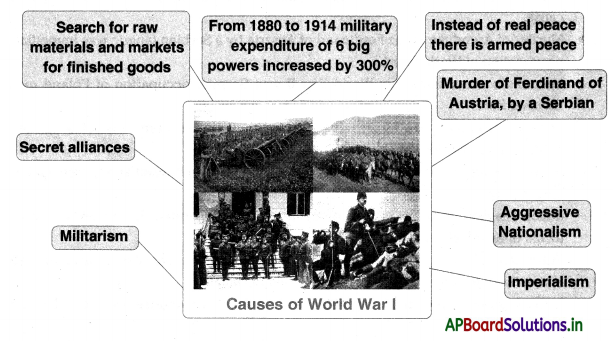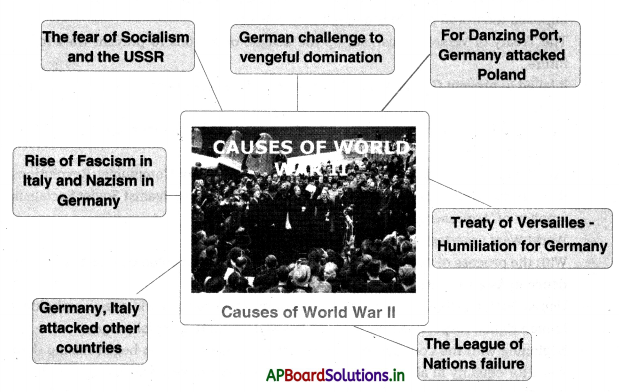Students can go through AP State Board 10th Class Social Studies Notes Chapter 13 The World Between Wars 1900-1950 Part 1 to understand and remember the concept easily.
AP State Board Syllabus 10th Class Social Studies Notes Chapter 13 The World Between Wars 1900-1950 Part 1
→ The world was divided into the ‘West1, experiencing economic growth, and the ’Rest’, colonially exploited by the West.
→ The 20th century was a period of great expectations, experiments, and dangerous developments.
→ The 1st World War broke out in 1914 and ended in 1918; Second World War was from 1939 to 1945.
→ World War 1 had claimed 10 million men in battle.
→ In World War II, 22-25 million military deaths, 40-52 million civilian deaths occurred,
→ Two main power blocks emerged – the Centre and the Entente or Allies
→ Every World War is triggered by some immediate provocations and some long-term cause.
→ The Murder of Archduke Franz Ferdinand of Austria by a Serbian fanatic was an immediate provocation of World War I.
→ The immediate provocation for World War II was the German occupation of Poland over Danzing Port.
→ Long-term causes are aggressive nationalism, imperialism, secret alliances, militarism for World War I.
→ Aggressive nationalism is the ideology of having pride in oneself and hatred against neighbors.
→ Italian Fascism from 1923 and the National Socialism of German Nazis were the other forms of aggressive nationalism.
![]()
→ European countries needed markets for their products and access to raw materials – paved the way for colonization that is called Imperialism.
→ Instead of real peace, the secret alliances created an atmosphere of fear and armed peace in Europe.
→ Militarism is the belief that military might is the best way to ensure security and war is a good way to solve problems.
→ To weaken Germany, the Treaty of Versailles, after completion of the First World War, imposed territorial penalties and military cuts on it.
→ The Treaty of Versailles also set up the League of Nations to prevent wars in the future.
→ It failed to prevent Germany and Italy from violating agreements and attacking other countries.
→ Germany under Hitler avenged the injustice meted out to them through the Treaty of Versailles.
→ The Western capitalist countries feared the repetition of Communist Revolutions like Russia in their countries, made Hitler act as a buffer against Soviet Socialism-policy of Appeasement of Hitler’.
→ World Wars asserted democratic principles.
→ With the process of decolonization, after World War II, the colonies rose to independence in Asia and Africa are more than a hundred.
→ United Nations Organisation was formed based on preserving world peace, upholding human rights, respecting international law, and promoting social progress
→ Beginning with the confidence of being breadwinners, women began raising their voices for equality in all walks of life. Getting the right to vote was a big step in that direction.
→ Industrial capitalism: Free trade (1813-60) West European countries, tasted industrial revolution, made Asian and African countries as colonies and used as chief exporters of raw material and market for manufactured goods
![]()
→ Alliances: Groups of countries, political parties, or people who have agreed to work together because of shared interests or alms
→ Aggressive: The ideology of having pride In oneself and hatred against nationalism neighbors
→ Militarism: The ideology that the military might is the best way to ensure security and war is a good way to solve problems
→ Easclsm: The Ideology of Mussolini, encouraged militarism and extreme nationalism
→ Imperialism: The practice of extending state’s rule over other territories, colonizing them
→ Great depression: A great decline In trade and general prosperity worldwide (1929-39)
→ Holocaust: The killing of millions of Jews by the Nazis In the 1930s and 1940s.
→ Nazis: The workers of the National Socialist Party (Nazi) of Germany, under Hitler
→ Power block: A country with great military strength and a lot of influence in world affairs
→ Nation-state: The independent sovereign nation inhabited by people of that state only, as opposed to several nationalities
→ Diplomatic alliance: Forming a group in connection with managing relations between countries
→ Colonization: Industrialized state making territories as colonies using as markets for their products and cheap suppliers of raw materials
![]()
→ Diktat: An order given, that people must obey
→ Decolonization: Granting of independence to a colony = freeing from colonial status

